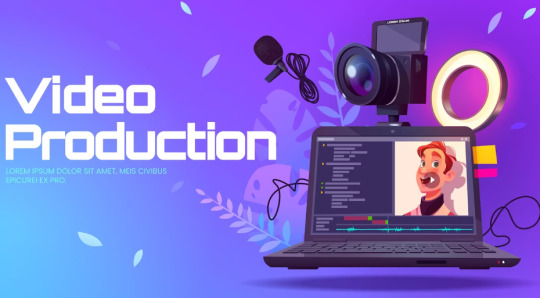Text
Virtual Production: Revolutionizing the Entertainment Industry
In recent years, virtual production has emerged as a groundbreaking technology, revolutionizing the entertainment industry in ways never seen before. From movies and television shows to video games and live events, virtual production has become a game-changer, offering unprecedented creative possibilities and cost efficiencies. In this article, we delve deep into the world of virtual production and explore how it is transforming the way we experience entertainment.

What is Virtual Production?
Virtual production is a cutting-edge technique that merges live-action footage with computer-generated imagery (CGI) in real-time. By utilizing advanced technologies such as motion capture, augmented reality, and virtual reality, virtual production bridges the gap between the physical and digital realms, enabling filmmakers and content creators to visualize and capture complex scenes in a highly efficient manner.
The Benefits of Virtual Production
Enhanced Creativity: Virtual production opens up a world of limitless creative possibilities. Filmmakers can bring to life fantastical worlds, unimaginable creatures, and breathtaking visual effects with unparalleled realism and detail. The ability to see the final result in real-time empowers directors and cinematographers to make on-the-fly creative decisions, fostering a collaborative and dynamic filmmaking process.
Cost Efficiency: Traditional production methods often involve costly set constructions, location scouting, and extensive post-production work. Virtual production streamlines these processes, significantly reducing production costs and saving both time and resources. With virtual sets and environments, filmmakers can create stunning visuals without the need for elaborate physical sets, thereby minimizing expenses associated with logistics and construction.
Time Saving: Virtual production accelerates the production timeline, enabling filmmakers to complete projects more efficiently. By eliminating the need for extensive post-production work, such as adding CGI effects in the editing phase, virtual production allows for real-time integration of visual effects during filming. This eliminates the lengthy waiting periods and accelerates the overall production process.
Realistic Performances: One of the most remarkable aspects of virtual production is its ability to capture realistic performances. With advanced motion capture technology, actors' movements and expressions can be seamlessly translated onto digital characters or creatures. This level of realism enhances the audience's immersion and emotional connection, creating a truly captivating viewing experience.
Applications of Virtual Production
Film and Television
Virtual production has become a game-changer in the film and television industry. It has been widely adopted for creating visually stunning films, such as the groundbreaking "Avatar" and "The Jungle Book." With virtual production, filmmakers can transport audiences to new worlds, breathe life into imaginary creatures, and tell captivating stories with unprecedented visual fidelity.
Video Games
Virtual production has also made significant strides in the realm of video games. The ability to capture real-time performances and integrate them into virtual environments has elevated the gaming experience to new heights. Games like "The Last of Us Part II" and "Cyberpunk 2077" have utilized virtual production techniques to create immersive and visually stunning worlds that blur the line between reality and fiction.
Live Events and Broadcast
Virtual production has even found its way into live events and broadcast productions. With the use of augmented reality, virtual sets, and live compositing, events like award shows, concerts, and sports broadcasts have been transformed into visually captivating spectacles. Virtual production allows for dynamic real-time visual effects and virtual elements that enhance the overall viewer experience.
The Future of Virtual Production
As technology continues to advance, virtual production is poised to become an integral part of the entertainment industry. The seamless integration of physical and digital elements, combined with real-time visualization and creative flexibility, paves the way for a new era of storytelling and audience engagement. We can expect virtual production to evolve further, pushing the boundaries of what is possible and continuing to reshape the way we consume and interact with entertainment content.
In conclusion, virtual production has emerged as a groundbreaking technology, revolutionizing the entertainment industry across film, television, video games, and live events. With its ability to enhance creativity, reduce costs, save time, and deliver realistic performances, virtual production is transforming the way we experience and engage with entertainment. As the technology advances and adoption increases, the future looks incredibly promising for virtual production, paving the way for unparalleled storytelling and immersive experiences.
#Backend#Fronted#Database#Qualitytesting#UnrealEngine#VirtualProduction#ArchitecturalVisualizationServices#Selenium#postman#node JS#Jira#AWS#google cloud#azure#Docker#Jenkins#IOS#android#Flutter#ReactNative#Xamarin#MySQL#MongoDB#PostgreSQL#Oracle#UI/UXDesign#3DModeling#InteriorVisualization#ExteriorVisualization#Animation
1 note
·
View note